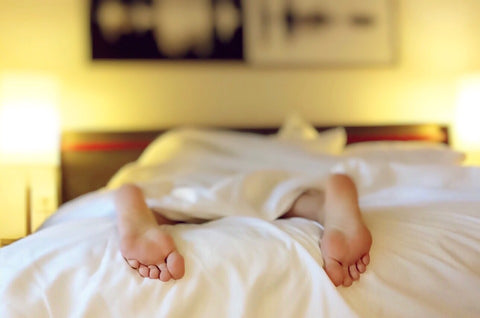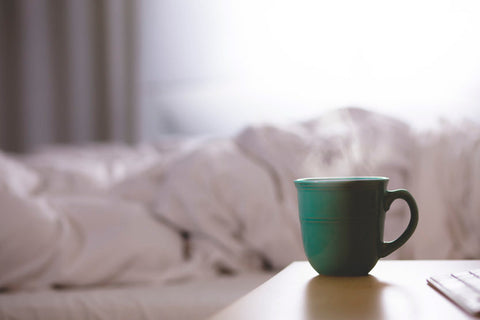After a long night of being unable to sleep properly, you often wake up feeling exhausted and in a bad mood. As we get older, this tends to happen more frequently as our sleeping habits change, and our metabolism slows.

"As we age there tends to be a reduction in the number of hours we sleep at night," explains Professor. Tom Mackay, an expert in sleep disorders, at the Royal Infirmary of Edinburgh. He adds that they are facing "a tidal wave" of sleep disorder cases at his Edinburgh unit. As our bodies age, there are changes that regulate our circadian rhythms. It is this internal clock that helps us distinguish between night and day. As we get on in years, this clock becomes less active, and so we find it harder to get to sleep at night and stay asleep throughout the night.
Everyone has the odd night where they cannot sleep properly, but when this becomes a regular occurrence, it can be a problem that leads to other medical conditions. Apart from making us feel lethargic and grumpy, sleep deficiency can lead heart disease, weight issues and often diabetes.
As sleep deprivation is such a common issue in modern life, many of us turn to medication to help alleviate the problem. But these drugs can also lead to additional medical problems such as drowsiness, dizzy spells, migraines and loss of appetite. Research by the British Medical Journal has recently identified several sleep medications, including zolpidem (Ambien) and temazepam (Restoril), with possibly leading to early deaths in common users.
Follow the tips
It's always best to avoid using sleeping pills on a regular basis. For help in getting a better sleep follow these tips:
1. Take Regular Excercise
Exercising every day not only helps your general fitness but can also help you get a good nights sleep. Natural sleep hormones are boosted through the exercise of any kind. Having a 30-minute walk during the day alone will improve your sleep. Dr Mackay states that a recent study into sleep patterns found that people who exercise for about three hours a week will find it easier to fall asleep at night than those who do not exercise at all. Make sure you don't workout too close to bedtime as this can cause a stimulation for the mind. Ideally, you should exercise first thing in the morning for greatest effect.

2. Only use your bed for sleeping and sex.
Avoid using your bed for eating or using it as an office. Also, don't watch tv in bed. Your body and mind should recognise that your bed means sleep and if you're lucky, sometimes a little bit of hows your father:-)
3. Make sure your bedroom's tidy
Watching TV is not the only distraction in your bedroom. The look and feel of your bedroom can have an adverse effect on your sleep. Make sure it's a relaxing and comfy place to be. For best effect keep it dark and at the right temperature for your body. This will encourage better sleep.

4. Get into a routine
Anything that can be repeated every night and made into a routine is also beneficial in getting you to sleep. Everyone likes to have the reassurance of having no surprises. Simple things like going to bed at the same time every night or listening to some music before sleep, helps your mind begin to wind down.
5. Try not to eat
An empty stomach can sometimes keep you awake at night, but overeating can also do the same. Refrain from eating a large dinner before bedtime. Typically eat around 2-3 hours minimum before going to bed. If you must eat something, then have some fruit or a little cheese. Anything that will see you through until breakfast.
6. Don't drink tea or coffee and alcohol
Avoid all caffeine and alcoholic beverages before bedtime. You should also avoid eating any chocolate. Caffeine is present in not only tea and coffee but also chocolate. Drinking alcohol also has a negative effect on sleep. Contrary to what people believe, but alcohol is a stimulant that will keep you awake. Also, avoid anything that is acidic like oranges or spicy foods that can cause heartburn.

7. Don't get stressed
Try to leave your daytime worries for the morning. Worrying about things such as unpaid bills or appointments is a wasted activity at night as you can't do anything Stress can affect the body in many ways. At night it is one of the most common reasons for not sleeping properly. Allow yourself time to relax before bedtime. Trying things like meditation or even deep breathing can help your mind and body relax and block out your day's activities.
RELATED:
SIMPLE HACKS TO IMPROVE YOUR SLEEP
8. Book a check-up with your GP
Excessive snoring can sometimes be linked to sleep apnea, restless or twitchy legs could be the onset of restless leg syndrome. There are numerous medical conditions that could be affecting the quality of your sleep. If you are unsure, then book an appointment with your doctor.
9. Be careful with sleep medications
If all else fails and you are still having trouble sleeping, then think about sleeping pills. Taken responsibly, these drugs can aid a restful sleep and allow you to relax more but they can also have major side effects. Follow these guidelines to ensure your not in danger:
Of Course, the most important thing that can help you get a good nights sleep is a good quality mattress. Corstorphine Bed Centre offers free help and advice on how you can select a mattress that is perfect for your individual needs. Call us on 0131334 5802 or visit our showroom in Edinburgh.
Article source here: Fed up with being tired during the day?